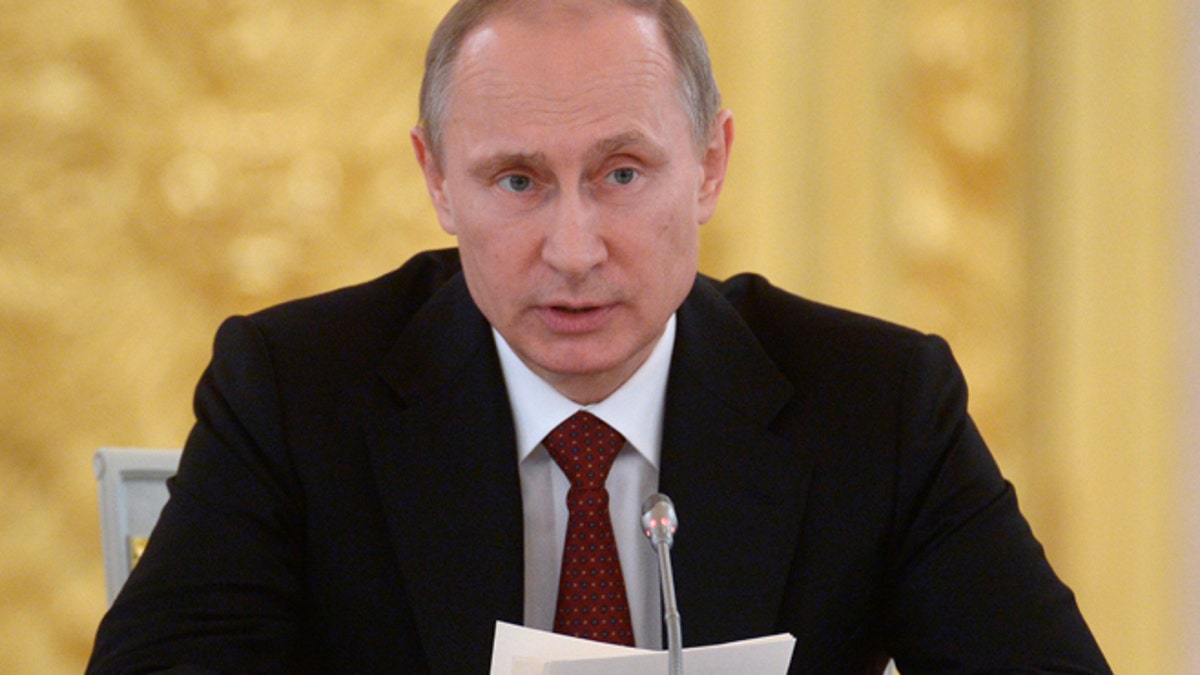
(AP)
In the wake of the recent events in Ukraine and Crimea, a number of American voices have suggested that we can deal with the problem of Russian oligarchs having a stranglehold on critical energy infrastructure to Western and Central European markets by allowing more liquefied natural gas (LNG) exports from the United States. And, naturally, politicians of all stripes have also made their threats and pledges of foreign aid to Ukraine in attempts to have at least a modicum of influence.
Both strategies take too narrow and reactive an approach to how energy policies affect global flashpoints created by a single country enjoying a stranglehold on natural gas supplies to NATO nations.
Any "fix" here should not be expecting Ukraine or anyone else to trade one assumed monopolistic supply system for another.
[pullquote]
America does not actively oppose oppressors, be they governmental or economic, just to raise itself in their place.
Certainly, approving open expansion of America’s LNG export capacity is a wise move for both domestic and global economic security. However, we should be wary of panaceas and red herrings that inevitably devolve into political litmus tests and won't address our larger global energy challenges.
The era of one-and-done political events about energy issues has long since outlived its usefulness. Instead, we must embrace a policy that allows the free flow of all energy supplies to and from our borders while providing aid to our allies and friends to do the same.
Managing energy policy as part of a geopolitical risk portfolio must be taken seriously. We can't simply trade barbs with bad actors on the international stage. Any one facet of geopolitics is part of a larger whole and rarely demands a simple fix. Rather, we need a more ecumenical strategy that views infrastructure development and efforts to control critical energy distribution nodes as vital to the strength of global security policies.
While President Obama has pledged $1 billion in foreign aid to Ukraine, which undoubtedly can help the government in Kiev, it does little to help protect the Ukrainian people or those farther west from the effects of another 2006-like supply disruption.
We should work closely with our allies and neighbors, regardless of international stature, to help them develop multiple access points to their own energy resources.
We have seen the politics of energy change significantly over the past 60 years. Twentieth century energy politics centered exclusively on supplies. (Let’s not forget what the "P&E" in OPEC stands for.) Today energy geopolitics are still shifting, and there should be little doubt that the main focus of future global energy policies will be access and transport.
We should also make a concerted effort to lend aid to Poland, Romania and Hungary to help them develop their own natural gas potential and support their sovereign right to do so.
Aid, even economic aid, does not have to be defined as simply a check and well wishes.
Enhanced access to markets from multiple energy supplies would certainly provide the region significant alternatives to the singular chokehold Russian gas enjoys. Coupled with freeing American energy supplies to become part of global access to gas markets, the specter of economic-cum-energy insecurity would be severely diminished.
American ingenuity unlocked the potential for a new energy renaissance with production from shale and tight sands currently called "unconventional reservoirs.” But unconventional reservoirs are not a uniquely American geologic occurrence. They are already being identified and developed in other countries by the private sector – as in the U.S. – by using the technological and operational innovations developed in American fields.
If we help our friends and allies to develop their resources with the benefit of our technical and environmental learning curves, then the resulting abundance of energy resources will be yet another hallmark of our long and distinguished history of using soft power in the world. That use of soft power is the vehicle for us to continue to be, as former Secretary of State Colin Powell said, "the protector of a universal value system . . . democracy, economic freedom and the individual rights of men and women to pursue their own destiny."
Those who profess to cherish individual liberty and economic freedom must continue to protect and advance those values for all people – especially for those we call allies and friends. There will always be those who abuse power to wrest control of resources and dictate how much energy others can use to maintain and expand their own sphere of influence. This risk continues to grow as national oil and gas companies move farther outside or attempt to redefine their own borders for greater access to production areas.
Russia's proven willingness to use a monopoly on natural gas pipelines to Ukraine and Western Europe is a singular example. By no stretch of the imagination will it be the last.
